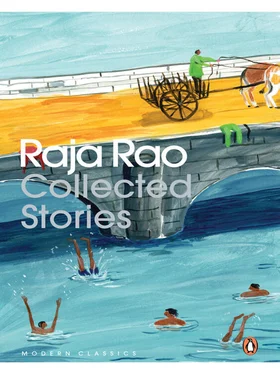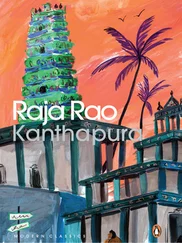Raja Rao - Collected Stories
Здесь есть возможность читать онлайн «Raja Rao - Collected Stories» весь текст электронной книги совершенно бесплатно (целиком полную версию без сокращений). В некоторых случаях можно слушать аудио, скачать через торрент в формате fb2 и присутствует краткое содержание. Год выпуска: 2014, Издательство: Penguin, Жанр: Классическая проза, на английском языке. Описание произведения, (предисловие) а так же отзывы посетителей доступны на портале библиотеки ЛибКат.
- Название:Collected Stories
- Автор:
- Издательство:Penguin
- Жанр:
- Год:2014
- ISBN:нет данных
- Рейтинг книги:5 / 5. Голосов: 1
-
Избранное:Добавить в избранное
- Отзывы:
-
Ваша оценка:
- 100
- 1
- 2
- 3
- 4
- 5
Collected Stories: краткое содержание, описание и аннотация
Предлагаем к чтению аннотацию, описание, краткое содержание или предисловие (зависит от того, что написал сам автор книги «Collected Stories»). Если вы не нашли необходимую информацию о книге — напишите в комментариях, мы постараемся отыскать её.
Collected Stories — читать онлайн бесплатно полную книгу (весь текст) целиком
Ниже представлен текст книги, разбитый по страницам. Система сохранения места последней прочитанной страницы, позволяет с удобством читать онлайн бесплатно книгу «Collected Stories», без необходимости каждый раз заново искать на чём Вы остановились. Поставьте закладку, и сможете в любой момент перейти на страницу, на которой закончили чтение.
Интервал:
Закладка:
‘You are too young, you idiot,’ swore the teacher. ‘You cannot fight now. Tell the truth, and love everyone, says Gandhiji.’
‘Gandhiji, Sir!’
‘Yes, it is the Mahatma who says it, the Saint. Speak the truth and don’t be cruel to anyone.’
‘Where is the temple of this Saint, Sir?
‘No temple for him, idiot. He is a living man. He is in prison now. He is always in prison. The Red-man has put him there.’
‘Like the Mother, Sir?’
‘Yes.’
‘But, Sir, there is one question I want to ask,’ he said, very thoughtfully. ‘If my sheep were to stray away, I have to beat them. Now, if I have not to be cruel should I beat them, or should I not?’
‘Oh, don’t bother,’ cried the teacher irritated, and Narsa went back to the hut ruminating whether to beat the sheep or not. And the snake, it is a wicked thing. It comes rushing towards you when it sees you. And they said tigers lived in the jungles, and the jackals, and many frightening things. He would ask the Master. He would ask him that very evening.
But when the evening came, and he sat by the Master, he forgot all about it. He only knew Mother was imprisoned by the Red-man, and the Red-man beat her. And because Saint Gandhi came to take her out, they put him also into prison. And they beat him too. Sometimes in anger, Narsa used to tear down long branches to beat the Red-man, only once, for beating but once is not cruel. He beat his sheep but once, and he liked them all the same. And when the train thundered over the bridge, he used to lift up his long sticks, and wave them in the air, for Red-men went in the trains, and they would be afraid. One day he even arranged an assault on them. He could not, of course, do it alone. So he spoke of it to Rami, Scavenger Sankanna’s daughter Rami. Rami came every day to the ashram hospital to do her business, and the Master’s brother used to cut jokes and say she was Narsa’s wife. Narsa liked it. And whenever he saw her, he used to run to her and undo her braid. And she would hide her face behind the sari and weep. But sometimes Narsa used to sit near the hospital and wait for her to come. When he saw her by the old-well-corner, he would do the business himself and surprise her. It pleased Rami. And every day he did the business Rami accompanied him as far as the railway embankment, and then she went back home along the line. Now, one morning Narsa took Rami with him, and having gathered a pocket full of gravel stones, he stood by the bridge, and as the train slowed down, he took up stone after stone that Rami handed him, and flung them against the train. When he had thrown three or four or five, he shivered and ran back — and that evening there came on him a fever such as he had never seen. It rose and rose and his body began to burn like the rocks by the canal. Auntie said it was because she had not offered the goddess the promised coconut and bodice-cloth. But he knew why he had fever. The devil in the Red-man’s body had seen him and jumped into him. And Narsa swore and prayed night after night, that never would he throw stones at the Red-man. The Saint, Gandhi, said, ‘Love the Red-man.’ He would love them. But he loved the Mother too. And he loved Saint Gandhi too for he had tried to rescue the Mother from the Red-man. ‘Saint Gandhi,’ he said, beating his cheeks to ask forgiveness, ‘pardon me, O Saint. You are great. You are next only to God. You are by the Mother. Saint, I shall never hate the Red-man again. Take away the devil from me, Saint. Saint, I fall at thy feet and kiss them. O Saint!’
The Saint seemed to take him in his arms and pat him as the Mother did. And Narsiga burst into such a flood of tears that it gently floated him down into softest sleep.
On a sultry autumn day when the earth was breathing out dust and nothing but dust, Narsa came home earlier than usual, and what should he see in the Master’s house but many and many a city-man and villager gathered round the Master, with happy faces and weeping eyes. ‘What is it, Uncle?’ he asked old Rachanna of the corner-field, who sat by the threshold. ‘The Mahatma is released from prison, my son,’ said the old man. ‘The Mahatma, the Saint,’ shouted Narsa, ‘the Mahatma, the Saint,’ and running out into the courtyard he danced and threw stones at the trees, and frolicked with the deer. He saw Nanjakka carrying the Master’s child in her arms, and he ran to the Little Master and said, ‘Little Master, the Mahatma is released. The Mahatma, the Mahatma!’ and he made the Little Master clap his hands and laugh. Then he ran into the pen and told the sheep the Mahatma was released, and rushing towards the fields where he had seen uncle Sampanna ploughing the figtree-plot, he said, ‘Uncle, hè, Uncle Sampanna! The Mahatma is released. Leave the fields and rejoice. The Mahatma, you know, is going to fly in the air today like Goddess Sita when she was going back from Lanka with her husband Rama. He is going to fly in the air in a chariot of flowers drawn by four horses, four white horses. He is going to pass by our home, Sampanna, what do you say to that, hè?’ and dancing round and round himself he fell on the grass and rolled. But Sampanna had urgent work to do, and the news did not touch him. So Narsa jumped up and ran to the old-well-plot where Carpenter Rangayya — the same who had fallen from the ladder some time ago — would be working. But the carpenter was fast asleep on a little plank, his turban spread over his face. ‘Hè, wake up, Rangayya, the Mahatma is out of prison, out of prison — the Mahatma. . ’ ‘I knew it, you idiot,’ growled Rangayya, ‘I knew it long before you.’ ‘Oh, uncle, you don’t know that the Mahatma is going in the air — like Rama and Sita going back to Ayodhya. Sita was taken out of prison and they flew back to Ayodhya. Master says the Mahatma will fly like that, with four white steeds, such as even the District Collector never had. The Mahatma. . The Mahatma. . The Mahatma. . ’ But seeing his ‘wife’ Rami coming along the canal path, he rushed towards her to declare the great news. ‘The Mahatma is released. . the Mahatma. . the Mahatma. . ’ he shouted out. ‘And the Mother too. The Mother and the Mahatma are both released by the Red-man. Hè, what do you say to that, Rami?’ ‘What do I say?’ mocked back Rami, smiling in her sari. ‘I knew it long before you. You see I’ve already the little flag. They gave it to me, the city-boys. And in the village square the Master is going to speak and all the householders are gathering there this evening to listen to him. Did you know that, you son of my woman?’
‘That, oh, yes, I knew it long, long ago,’ he lied. ‘But you don’t know, the Mahatma is going in the air, with his wife Sita, and in a flower-chariot drawn by sixteen steeds, each one more beautiful than the other. And they will fly through the air and the heavens will let fall a rain of flowers. The Mahatma will have the Mother on his right, and our Master at his foot, and they will go across the clouds’ and the stars. And we shall gaze at them. Come, Rami,’ he dragged her towards him, ‘come, we shall run into the village to sit in the square to be the first to hear the Master speak. Come.’
He hooked his arm into hers, and taking the flag thrust it up into the air, and shouted, ‘Mother, Mother, Mother,’ and they ran across rut and puddle, dung and boulder, down the Rampur road, amidst screeching bats and hovering crows, over the canal bridge, and under the bulging, haunted pipal, and then turning round the Kuppur mound, they faced the cattle dust of the darkening village. The air was light, and the night was just falling. But, Lord, what a lot of stars!
A CLIENT
THE last bell rang. Gathering his notes and his books Ramu left the class with his usual hurry. Sundaresha was standing on the steps talking to somebody. No, Ramu would not see him. No, he would not! Unconsciously he jumped down from the verandah and walked along the gravelled path with redoubled speed. How he hated them all, these rich, carefree people. . Oh! if only he had his own books. It was not his fault if he had not done well in his last examinations. How could he? One cannot learn without books. His brother could write all that nonsense about working hard, getting a university scholarship, and bringing a name to their ancient, revered family. If only he knew what it was to wash one’s own clothes, clean the vessels, cook the food and sweep the floor, and spend uncountable hours waiting at the doors of Sundaresha’s to be condescendingly honoured with the loan of a book. To talk to them charmingly, when you detested them in the heart of your hearts, to flatter them, cringe before them, and even slave for them when necessary. It was not easy like swearing before peasants or commanding one’s wife. Bangalore is not Hariharapura. If only his brother knew that.
Читать дальшеИнтервал:
Закладка:
Похожие книги на «Collected Stories»
Представляем Вашему вниманию похожие книги на «Collected Stories» списком для выбора. Мы отобрали схожую по названию и смыслу литературу в надежде предоставить читателям больше вариантов отыскать новые, интересные, ещё непрочитанные произведения.
Обсуждение, отзывы о книге «Collected Stories» и просто собственные мнения читателей. Оставьте ваши комментарии, напишите, что Вы думаете о произведении, его смысле или главных героях. Укажите что конкретно понравилось, а что нет, и почему Вы так считаете.












